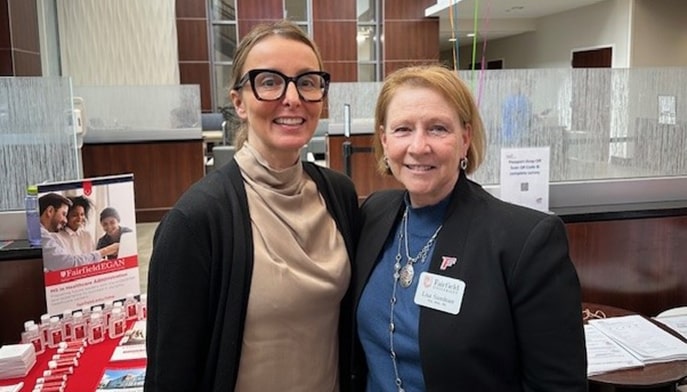Demand for highly skilled business professionals has always been high. But with the increasingly competitive nature of the nation’s job market, many experienced workers are considering the potential benefits of post-baccalaureate education.
If you’re interested in building upon your existing business acumen and growing your repertoire of in-demand skills, a Master of Business Administration (MBA) could help position you for the advanced management or executive leadership roles you’re seeking.
With courses that cover a broad range of business functions, these graduate degree programs are designed to develop professionals like you into versatile leaders. But what do you learn in a graduate business program, exactly? Join us as we take a closer look.
What to expect from an MBA program
Data has long supported the notion that those who obtain advanced degrees tend to see higher employment rates and more attractive salary prospects. But demand for new master’s-educated business talent is seeing particularly significant increases.
According to the 2022 Corporate Recruiters Survey from the Graduate Management Admission Council (GMAC), 92 percent of recruiters intend to hire newly-minted MBAs in the next five years. When it comes to MBA courses and program outcomes, the skills graduates gain are highly desired by employers across industries.
Take a look at what you can expect from an MBA program like the one at Fairfield University’s Charles F. Dolan School of Business.
Typical MBA curriculum
While many graduate degree programs help students hone a very specialized skill set, the MBA curriculum aims to enable students to develop a mastery of all core business areas.
These programs are designed to assist students in building the broad competencies required to excel as business executives. As such, the typical MBA curriculum is expansive, covering a breadth of different business topics.
Some common MBA course topics to expect include:
- Accounting
- Analytics
- Business Ethics
- Communications
- Economics
- Marketing
- Organizational Behavior
- Strategy
- Taxation
That said, MBA students may still come across opportunities to pursue a particular specialization in greater depth. Students in the Fairfield Dolan MBA program, for example, can select a specialized course of study, choosing from the following in-demand business concentrations:
- Accounting
- Analytics
- Cybersecurity
- Finance
- Management
- Marketing
Specialized MBA tracks like these empower students to broaden their leadership abilities while sharpening their skills in one of many important industry-specific concentrations. Still, some MBA programs take it a step further by allowing students to customize their curriculum to fit their vocational needs.
The Fairfield Dolan MBA, for example, was designed on the foundational concept that one size does not fit all. Rather, each student is given the flexibility to customize a unique courseload that is tailored to their professional background, learning style, and career aspirations. Whether students opt to learn fully online or in a hybrid format, they are immersed in a robust, individualized curriculum that will help them advance in their industry.
Top MBA skills
When considering this advanced business degree path, it’s essential to note that MBA programs often seek incoming students who already possess many of the fundamental skills required of business professionals. These programs are designed to help you build upon your existing professional knowledge and experience, qualifying you for advanced roles in the industry.
“An MBA attempts to provide a 360-degree view of what it takes to run a business. Students aspiring to become future leaders can develop the competencies needed to manage operations, people, and outcomes,” explains Dr. Mousumi Bose Godbole, associate professor at the Charles F. Dolan School of Business. “An MBA helps students become ethical leaders who can strategize for a better future.”
Developing and maintaining a mastery of all core functions of business also requires a balance of hard and soft skills. The list of potential MBA program outcomes is extensive, but students can expect to gain many of the following business competencies:
- Strategic problem-solving
- Interpersonal communication
- Organizational leadership and development
- Networking
- Advanced data analysis
- Informed decision-making
- Ethical leadership
Each MBA program will take its own approach to helping students develop these fundamental business skills. When searching for a degree that will help you meet your professional and personal goals, it helps to analyze the program’s objectives and overall mission.
The core aspirations of the Fairfield Dolan MBA, for example, include accomplishing the following:
- Each student will be skilled in understanding theories and practice to perform managerial decision-making in specific business areas.
- Each student will be capable of synthesizing/analyzing information so as to make sound business decisions.
- Each student will foster core values that help build ethical managers who achieve organizational goals.
The MBA at the Charles F. Dolan School of Business is ranked among the top 25 in the nation, with a 99 percent job placement rate among graduates. The skills gained in the program have qualified grads to work in sought-after positions at organizations like Synchrony, IBM, Northwestern Mutual, Medtronic, and more.
Fairfield University students also have access to BetterManager Leadership Coaching which is a program that provides personalized guidance to help prepare you for the next phase of career growth. This level of unmatched support enables MBA graduates to move forward in their professional endeavors with strategy and confidence.



